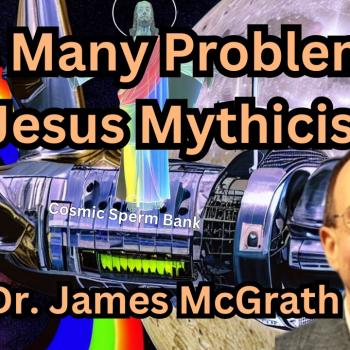I sometimes wonder if mythicists realize when they are making fools of themselves. If they do, then they are presumably akin to clowns and comedians who provide a useful service in providing us with entertainment. If they are unintentionally funny, then their clowning around in some instances may include misrepresentation of others which, however ridiculous, requires some sort of response.
A case in point is Neil Godfrey’s recent posts about how historians work and the specific case of Jan Vansina. I will ignore Godfrey’s decision to misrepresent what I was saying in a blog post in spite of my having pointed out this misrepresentation to him on my own blog (you can click through and read that if you are interested).
But on the misrepresentation of Vansina, and of Howell and Prevenier, a few brief points are in order, which I suspect will show clearly to anyone interested that Godfrey either is either failing to comprehend Vansina, Howell, and prevenier, or is willfully misrepresenting them.
First, Godfrey quotes Howell and Prevenier’s From Reliable Sources and their discussion of Vansina’s work in oral history: “Historians can place trust in oral sources only to the extent that they can be verified by means of external evidence of another kind, such as archaeological, linguistic, or cultural” (p. 26). He then ignores the question of what sort of linguistic and cultural evidence is being referred to and proceeds as though these points had not even been mentioned. He seems to think that his readers are foolish and gullible, and perhaps some are, but not all.
Godfrey then writes, “The chapter thus refers to “oral reports”, “oral evidence”, “oral sources”, “oral communication”, “oral acts”, “oral witnessing”. HJ scholars do not have any evidence like this for Jesus. The early Christian evidence is all written and literary, not oral, and it is all secondary, not primary.” At this point, Godfrey is either being obtuse or deceptive, or has not actually read Vansina’s books (the fact that they are books but he placed their titles in quotation marks, even though Godfrey is a librarian and should know better, is indeed suspicious). Vansina studies the oral histories of African tribes including for periods before the living memory of those he interviewed. In such cases, the same situation exists as in the Gospels, except that the Gospels can be shown to be closer in time to the events they purport to record than some of the African oral traditions discussed in Vansina’s book. What exactly are the external controls of the sort Godfrey thinks are needed? How does he know that the stories being told by a tribe’s storyteller to Vansina were not originally about celestial rather than terrestrial figures? How does he know that they were not concocted in a conspiracy to rewrite history at some earlier date?
He doesn’t. And since he rejects the sorts of criteria that historical Jesus scholars and Vansina use, assessing whether a tradition embarrassing to the tribe or group is likely to have been invented, presumably Godfrey ought to reject Vansina’s claim to be a historian – and Howell’s and Prevenier’s too, since they view Vansina’s work favorably. But he doesn’t do that – either because he genuinely cannot comprehend what he is reading, or because he wishes to deceive readers into thinking that he is accurately discussing what historians write and do. But he is no more doing that than he is accurately representing what other bloggers say with whom he disagrees.
Vansina – like historical Jesus scholars – recognizes that the traditions of a community are not infinitely flexible. Mythicists, on the other hand, seem to think that communities provide no controls on innovation and deviation from tradition, and that probability matters little, at least where the historical Jesus and early Christianity are concerned.
Since I am gearing up to begin the semester, teaching on among other things the historical Jesus, I can’t help but relate this to the experiences educators sometimes have with students. Mythicists clearly would fail at courses that required careful reading and accurate representation of what they have read, the critical interpretation of texts, or the use of historical methods in a consistent fashion. Perhaps the interesting question to ask is whether mythicists are like those sorts of students who, try as they might, can’t manage to do well in a subject area, and if so, whether it is because of innate inability, dogmatic adherence to their presuppositions, or failure to understand how a given field’s methods and tools differ from those in other areas they have studied and are more familiar with.
Or are they like the students who don’t care, or who think they already know all the answers?
That mythicists either fail to grasp what historians and scholars write, or deliberately misrepresent them, is clear. So perhaps the interesting question is to ask why.












